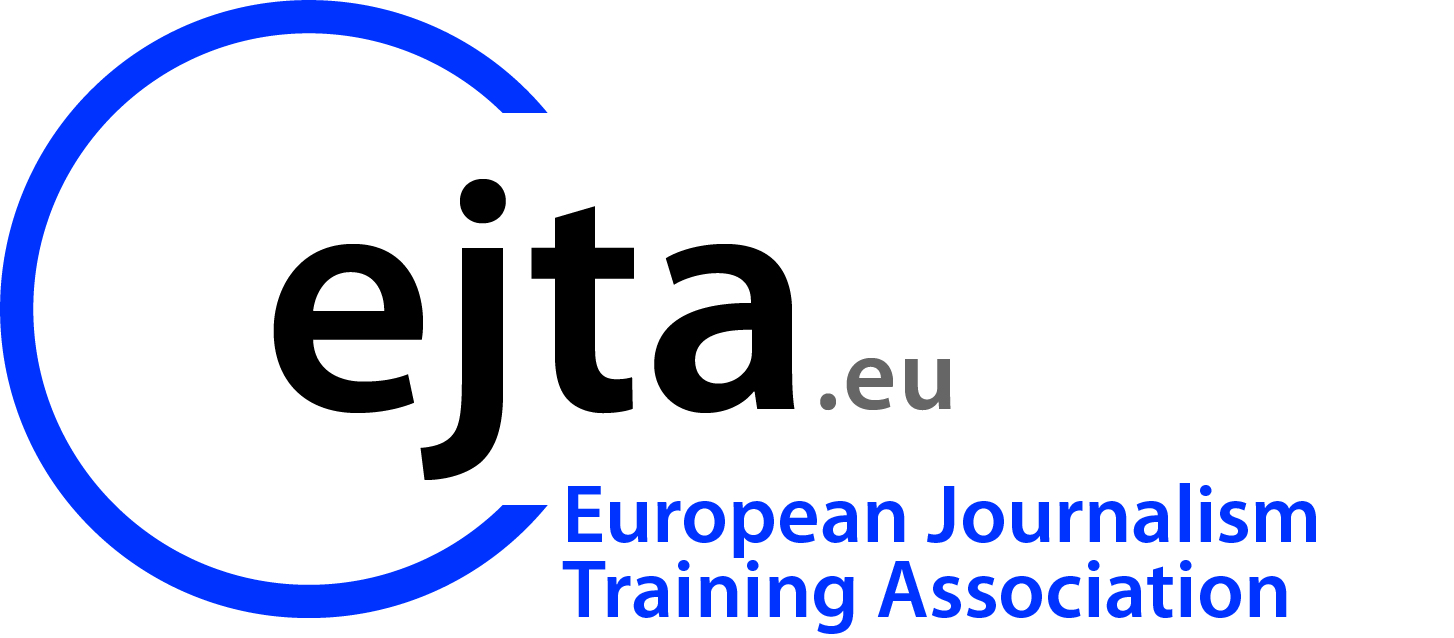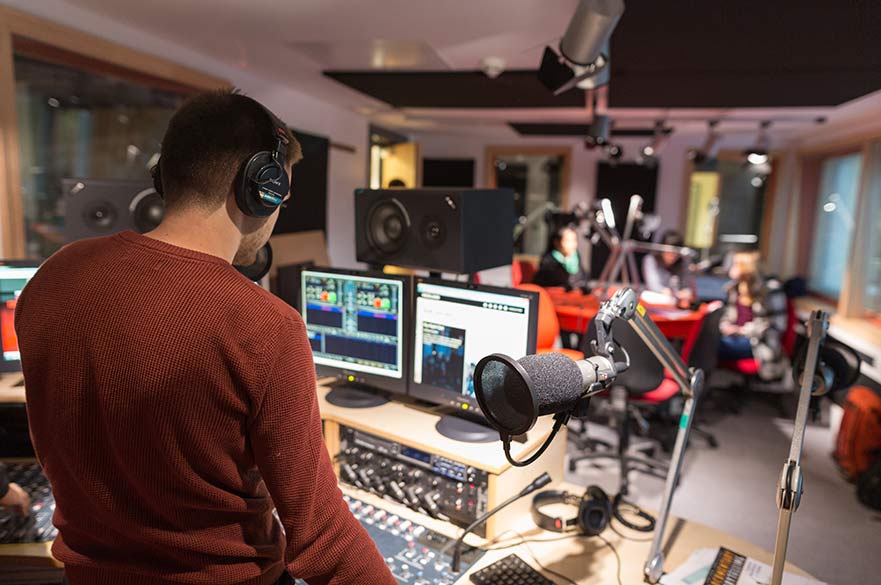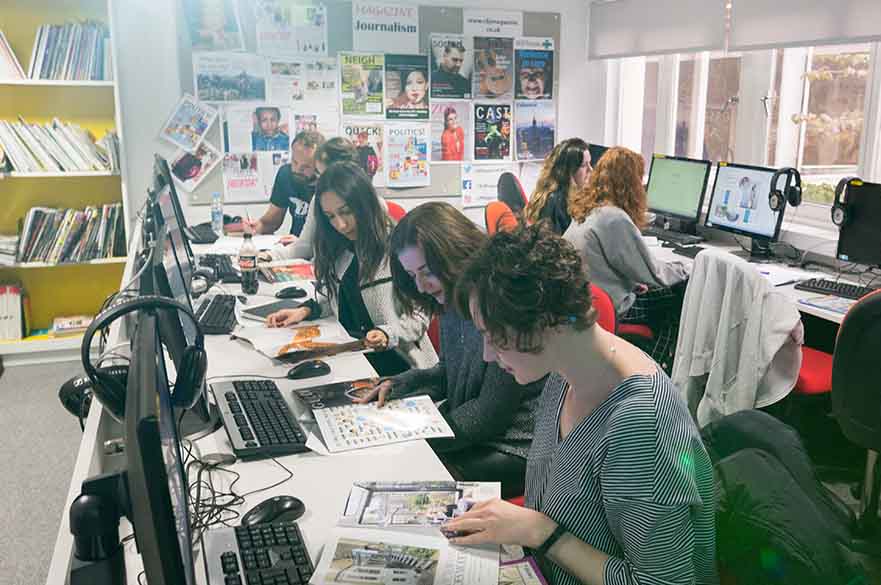Journalism MA
About this course
Journalism matters. And it matters now more than ever.
In a world overrun by misinformation, where truth is under threat like never before, it is journalists who hold power to account, and give a voice to the voiceless.
This journalism Masters course is a bridge between undergraduate study and the fast-paced, exciting, and invaluable world of professional journalism. You’ll be seeking out your own stories from day one, and writing and producing written, video, and audio pieces to tight deadlines in our industry-standard student newsroom, one of the biggest in the country.
You’ll develop key skills in news, web, and feature writing, dive into the engaging world of social media and audience analytics, and get to grips with the frameworks that underpin modern journalism, from media law and ethics to politics and commercialisation. And you’ll also have lots of opportunities to specialise in key areas including podcast production, data journalism, and public affairs.
Industry recognition

We are proud to be part of the BAFTA Albert education partnership

This course is accredited by the National Council for the Training of Journalists (NCTJ)

All Journalism courses at NTU are recognised by the European Journalism Training Association
NCTJ Diploma
Students on this course also work towards their NCTJ Diploma.
You will study the diploma’s mandatory elements as part of your core modules. You will also study 35 credits worth of elective elements, which will vary depending on your core and optional modules, but may include:
- Shorthand for journalist
- Videojournalism for digital platforms
- Media law court reporting
- Journalism for a digital audience
- Data journalism
Interested in Journalism?
Dip your toe in the water with our Journalism short course programme for professionals that runs throughout the year.
What you’ll study
There’s a perception that journalism is a hard industry to get into, but we’ve got a track record of supporting hardworking students into a range of roles as working journalists.
Partly that’s due to our MA Journalism’s accreditation from the National Council for the Training of Journalists (NCTJ), which means that you’ll graduate with a second qualification that shows employers you have the skills they’re looking for.
All of our teaching team have extensive experience as journalists, with many still working alongside this MA journalism course. Their professional knowledge and networks will help you on your own journey as you develop the skills to become a professional storyteller, reporter, writer and editor.
The highlights of MA Journalism include:
- Graduate with a journalism Masters and an NCTJ Diploma – two qualifications that will help you to stand out from the crowd.
- Our Masters in Journalism is also recognised by the European Journalism Training Association (EJTA) due to the quality of learning and teaching at NTU.
- Hear from some of the biggest names in industry with our series of talks from guest speakers who’ll share their expertise and advice.
- Incredible industry-standard facilities including our full-size newsroom, TV and radio studios, control room, camera and audio equipment, and media suites.
- Gain real-world experience with a work placement of at least ten days, including the opportunity to work with Nottinghamshire Live, the regional news brand in the city.
- Our proven track record of helping students like you into industry – many of our graduates work for organisations including The Times, The Guardian, The Independent, Sky Sports, BBC, NME, The Wall Street Journal, and the Press Association.
Being a Journalist (40 credit points)
Embark on a journey where you will acquire the indispensable skills needed to thrive in the field of journalism. Discover the art of persuasive copywriting and seamless editing. Learn to capture exceptional photographs, videos, and audio. Uncover the secrets of crafting engaging stories and promoting them through the power of social media. Delve into specialized areas such as court reporting and explore the ethical and regulatory challenges faced by journalists.
Media Law & Ethics (20 credit points)
Enter the world of media law to grasp its impact and scope. You will acquire the essential professional compliance skills and practical know-how to allow you to navigate areas like defamation, privacy, and copyright. Develop critical understanding of key legal principles for various journalistic platforms and gain practical skills in recognising publication risks and amending content. Explore the effects of reporting restrictions on journalism to elevate your legal awareness and excel in the media landscape.
Social Media and Audience Analytics (20 credit points)
Explore social media's impact on journalism and society through critical discourse, drawing from journalism research, media studies, and ethics. Uncover practical tools to craft compelling social media content, backed by audience analytics to elevate your critical thinking, questioning, and creative prowess.
Data-driven Investigations (20 credit points)
Discover data-led investigative projects in journalism. Explore the fusion of industry practice and theoretical discourse to gauge the impact of data journalism on society. Uncover new digital methods to power your research and enhance your multiplatform storytelling abilities. Delve into the world of open data and alternative sources of information. Gain the skills to analyse, understand, and interpret statistical data for your news audience. Create compelling journalistic content from data-driven insights.
Journalism Major Project (60 credit points)
Unleash your creativity and expertise in a captivating capstone module. Show off your planning, design, and production skills by creating a compelling piece of masters-level journalism or research. Take your pick from alternative assessment options: the Negotiated Dissertation, Individual Negotiated Project, Group Negotiated Project, or Negotiated Work-Based Learning Project. Delve into in-depth research, employ advanced data collection or journalistic techniques, and bring forth an inspiring creation.
Choose one
Public Affairs for Journalists (20 credit points)
This module immerses you in the inner workings of local and central government. Uncover political dynamics, master journalism skills, and navigate interviews with officials, while getting hands-on experience crafting news features on government topics. From power divisions to EU post-Brexit dynamics, you'll dissect it all. Elevate your reporting with practical insights and lingo mastery, all while gaining a fresh perspective on political landscapes.
Podcasting Production (20 credit points)
Develop a critical understanding of podcasting's role in contemporary media. Learn practical skills for professional podcast production. Analyze the link between traditional audio production and podcasting's place in journalism and media. Explore content, context, and the commissioning process. Gain insights on logistics and monetization from expert guest speakers. Appreciate, understand, critique, and contribute to podcasting in journalism.
We regularly review and update our course content based on student and employer feedback, ensuring that all of our courses remain current and relevant. This may result in changes to module content or module availability in future years.
Don’t just take our word for it, hear from our students themselves
How you're taught
How will I learn?
You’ll research your own stories, find your own interviews, and craft features, columns, reviews and more as you put into practice the skills you’ve been learning in the course workshops and seminars.
Most of the learning is done in small group environments with practical and active exercises rather than lecture-style teaching. You’ll also be completing a significant amount of work outside of timetabled sessions under your own direction – this is often where the best learning happens, but our expert teaching team will always be on hand to support and guide you.
You’ll learn through a mix of:
- small-group seminars and workshops where you’ll develop key journalistic skills under the guidance of your tutors, who all have significant experience as journalists
- lectures that explore some of the biggest and most important related areas, including media law and ethics
- technical workshops where you’ll learn how to record and edit audio and video for use online using professional standard cameras, mics, and editing software
- getting hands-on in our newsroom with the same tools and tech used in industry
- collaboration with industry publications and professionals on a wide range of exciting real-world briefs that mirror the working practices of modern journalists
- work experience with one of our partners such as the Nottingham Post, Derby Telegraph, Stoke Sentinel, Lincolnshire Echo, and Birmingham Evening Mail
- a major ‘capstone’ project where you’ll independently plan, design and produce a series of compelling pieces of Masters-level work on a contemporary topic of your choice.
How you're assessed
You’re completing this Masters in journalism to become a journalist, and so you’ll be assessed by the quality of journalism you produce. You’ll work to put together a practical portfolio that demonstrates you’ve developed the skills working journalists require. This portfolio will also help you to stand out to employers as you seek roles in the industry.
Alongside your portfolio, you’ll be assessed through essays, exams and presentations.
Contact hours
12-16 hours per week with 40 hours contact during each of the two news week sessions held over the year.
Careers and employability
With top industry accreditations, a host of hands on work experience opportunities, and the insights and guidance of our expert teaching team, this course has an outstanding reputation across the world of journalism. Today, our graduates are working locally, nationally, and internationally with major publications and organisations like the BBC, Guardian, The Times, Sky Sports, Mail on Sunday, Google, Facebook, Nottinghamshire Live, Derbyshire Live, and Leicestershire Live. Their roles span everything from news report to senior editor.
The skills you’ll develop on this course and the experience you have learning at NTU will also prepare you for working in many related fields. Many of our graduates go into roles within the wider communication sector, in areas such as marketing, social media, public relations, technical writing and corporate communications.
Wherever you decide your passion lies, you’ll receive amazing support at a University ranked first in the UK for employability (Uni Compare 2025).
Campus and facilities
You’ll mainly be studying in the Centre for Broadcasting and Journalism in the Chaucer building on the City Campus, with access to facilities including our newsroom, TV studio, and dedicated radio and podcast production studio.
NTU’s City Campus has everything you’ll need to stay busy between lectures. As well as the Boots Library and its beautiful roof garden, there’s our stylish Students’ Union building and two-storey, 100-station gym; a whole host of cafés, bars, restaurants and food outlets for every taste; our much-loved Global Lounge; performance and rehearsal spaces for musicians; and much, much more!
Take a few steps off campus and you’ll find yourself in the heart of Nottingham — a legendary student city stuffed with history, culture, and well-kept secrets to discover at your leisure.
Entry requirements
UK students
Academic entry requirements: 2.1 honours degree and enthusiasm for, or experience of journalism.
Applicants with a 2.2 and substantial experience will be considered.
Applications from candidates with non-standard entry qualifications will be considered on an individual basis if they can demonstrate relevant professional experience.
Other requirements: All journalism applicants will be asked to submit a written piece as part of their application. View written test. This will be judged against clear criteria. When assessing sample writing manuscripts we are looking for work of at least a satisfactory (pass) standard in terms of language, content, observation, structure and voice.
Additional requirements for UK students
There are no additional requirements for this course.
Other qualifications and experience
We welcome applications from students with non-standard qualifications and learning backgrounds and work experience. We consider credit transfer, vocational and professional qualifications, and any work or life experience you may have.
You can view our Recognition of Prior Learning and Credit Transfer Policy which outlines the process and options available, such as recognising experiential learning and credit transfer.
Getting in touch
If you need more help or information, get in touch through our enquiry form.
International students
Academic entry requirements: 2.1 honours degree and enthusiasm for, or experience of journalism.
Applicants with a 2.2 and substantial experience will be considered.
We accept equivalent qualifications from all over the world. Please check your international entry requirements by country.
Other requirements: All journalism applicants will be asked to submit a written piece as part of their application. View written test. This will be judged against clear criteria. When assessing sample writing manuscripts we are looking for work of at least a satisfactory (pass) standard in terms of language, content, observation, structure and voice.
English language requirements: See our English language requirements page for requirements for your subject and information on alternative tests and Pre-sessional English.
Additional requirements for international students
If you need help achieving the academic entry requirements, we offer a Pre-Masters course for this degree. The course is offered through our partner Nottingham Trent International College (NTIC) based on our City campus.
English language requirements
View our English language requirements for all courses, including alternative English language tests and country qualifications accepted by the University.
If you need help achieving the language requirements, we offer a Pre-Sessional English for Academic Purposes course on our City campus which is an intensive preparation course for academic study at NTU.
Other qualifications and experience
We welcome applications from students with non-standard qualifications and learning backgrounds and work experience. We consider credit transfer, vocational and professional qualifications, and any work or life experience you may have.
You can view our Recognition of Prior Learning and Credit Transfer Policy which outlines the process and options available, such as recognising experiential learning and credit transfer.
Sign up for emails
Sign up to receive regular emails from the International Office. You'll hear about our news, scholarships and any upcoming events in your country with our expert regional teams.
Getting in touch
If you need advice about studying at NTU as an international student or how to apply, our international webpages are a great place to start. If you have any questions about your study options, your international qualifications, experience, grades or other results, please get in touch through our enquiry form. Our international teams are highly experienced in answering queries from students all over the world.
Policies
We strive to make our admissions procedures as fair and clear as possible. To find out more about how we make offers, visit our admissions policies page.









